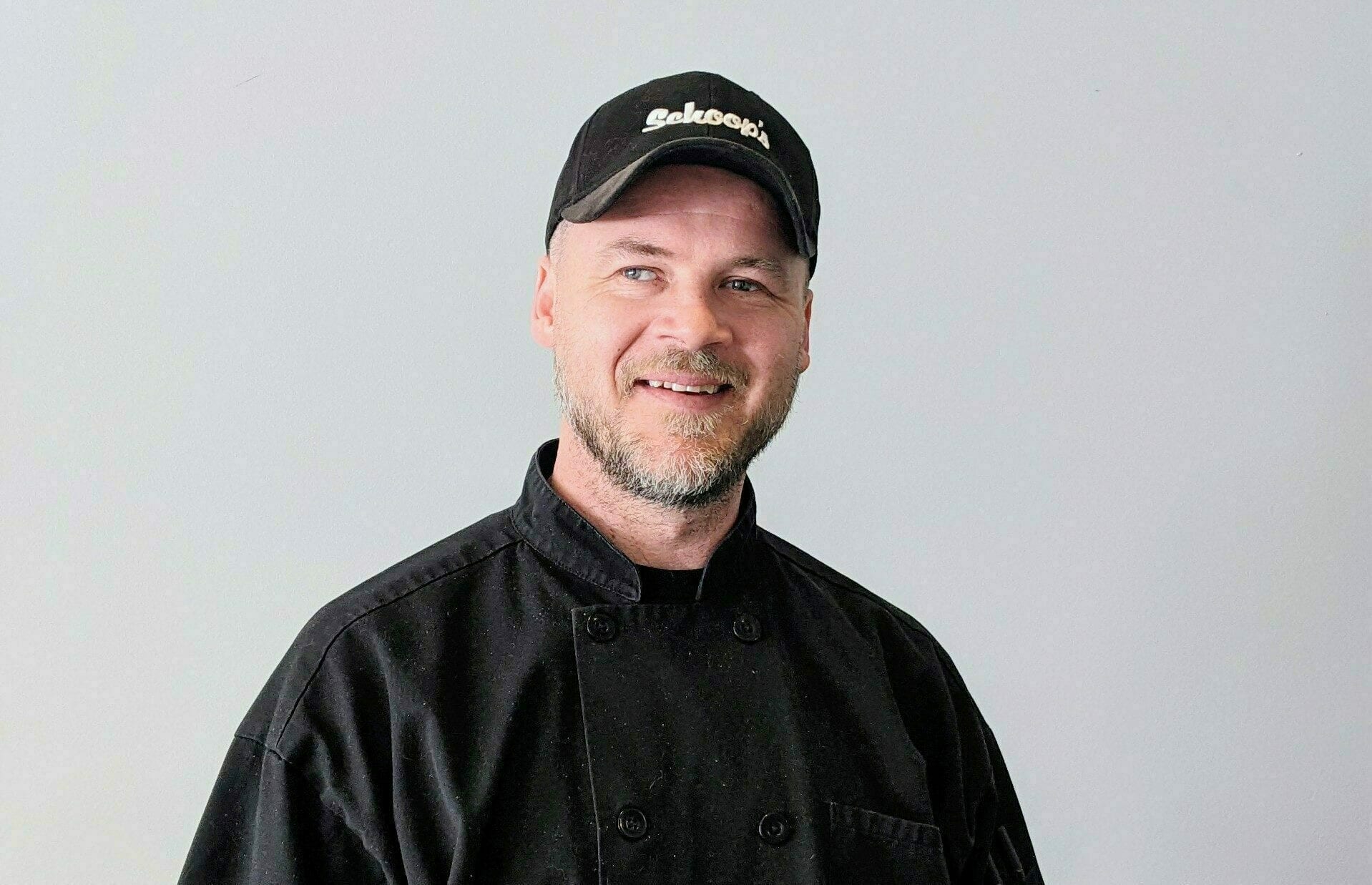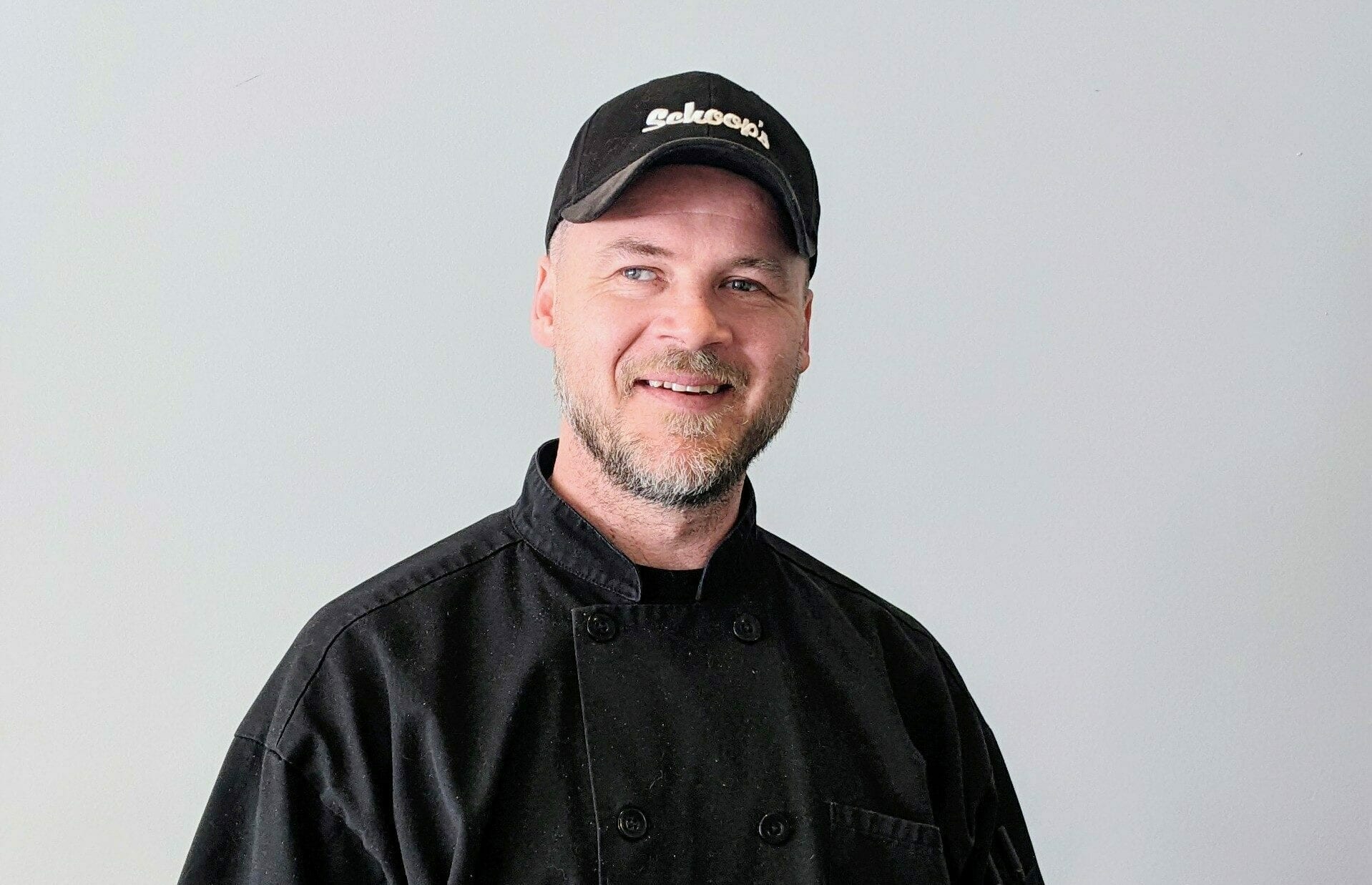FRIEND REQUEST: LOU JOHNSON OF SCHOOP’S

Lou Johnson has been cooking since 1996 when he first started at Taco Bell. Now at Schoop’s, he has found deep satisfaction in the art of each dish he prepares, but also in the relationships with his team and his customers. I appreciated his passion for the industry and the high standard he sets to meet each day.
LOCAL 219: Hi Lou. Let’s dive in. How long have you been here for?
LOU JOHNSON: I’ve been at Schoop’s for coming around eight years. I’m the Assistant Kitchen Manager.
L219: Were you in other kitchens before this?
LJ: Oh, yeah. I’ve been I’ve been doing this since 1996. I started at Taco Bell. Then I joined the Navy, and the Navy has weird terms for things. I wasn’t familiar with what a bulkhead or quartermaster was but I knew what mess meant; so when they put the jobs out I knew, “Oh cooking. I know what that is.”
So that’s where I truly started my culinary journey. That was in ‘99, and I just went from there.
L219: That ties in to my usual first question of: was it hobbies, circumstances, or your childhood that brought you to this position? Did you have an interest in cooking as a kid?
LJ: I would say a slight interest. What did it for me is just how creative you can be.
I remember the first really good thing I ever gave somebody and it was a very important thing to me.
In the navy, everything is kind of, you know, blasé ingredients, and we had this clam chowder. It was not anything, even by name, what it described; It was terrible. And I wanted to do it right, so I asked my watch captain, and he was like, “I don’t care what you do. Go ahead.”
So I made clam chowder properly. I remember serving it, and seeing how happy people were, and it brought something out of me. I knew like right there, that reaction. That’s when I was like, “Okay, I’m addicted to that.”
L219: The joy you can bring people?
Yeah, and ever since soup, sauces, and gravies have been like my fire, and there’s so much you can do with it and make something just remarkable out of it. It’s so much fun.
We sell this stuffed pepper soup. Yeah, it’s a big hallmark here. I love watching it go because we can sell five gallons of it in about an hour or two. You actually have to almost request it.
It’s such a good feeling to see something that I made be so sought after.
L219: What gets you out of bed in the morning. What makes you tick?
LJ: I love coming in here because I keep it running. There are many little parts and I like to make those little parts work. This place is a big deal.
I come to work an hour early every day without fail. I prepare for my day, and I enjoy being around the people. These are not just my colleagues; they’re my friends and family I’ve known for years.
This is the first kitchen I’ve worked where we’re all in this together. We all wear Schoop’s. My waitresses out here, they’ll come back and cook If I’m slammed on the grill, they’ll prep and likewise we’ll bus whatever we need to help a customer out.
L219: No one’s better than anybody else.
LJ: Yeah, there are no fancy titles or anything like that, you know?
L219: I love that. That requires a level of maturity.
LJ: It took years to cultivate. Covid did a lot of damage to the restaurant industry. A lot of it irreparable, but one of the flowers that grew out the ashes is it caused us to take a look at ourselves, because there was an exodus out of the business.
If you asked them, why? A lot of them, I would argue, 90% of them would say, “Well, it’s just the way we were treated.” It caused us as bigger people in the restaurant to say, “Are we being like that? Oh, we are being a little toxic.”
So I like that we are becoming more accepting, we’re talking about things, instead of arguing about things. We’re coming together.
L219: I think it’s unfortunate we had to encounter this kind of event for heads of companies and leaders to recognize that if they wanted to keep people around real changes had to take place. Your team has seen how that level of transparency is so valuable.
LJ: You have a fork in the road. Either you can stick to the old school way and be stubborn or you can evolve, and we like to be on the side of evolving. It’s really helped out because my team that I have now, because of that inclusion, is so solid.
L219: It’s easy to walk away from something you don’t care about, but when people rely on you, and you’re really invested in each other’s lives, not so much. Who has been the biggest influence in your life?
There are many chefs that I have gleaned something from, but closer to home, Paul Kelly. He was the chef and co-owner of Matey’s when it was open. I learned a lot from him.
He just loved what he did and he is one that taught me how to like, cultivate a recipe, you know, tone it down. Just make a simple thing stand out. Also, Chef Billy Ross, who we had the pleasure of having here for a little bit helping us out and taught me just how to put love in a recipe.
You could be the most talented chef in the universe and have all the right tools, but if you don’t really care, it will taste dry and dull. It’s a respect for the ingredients. For me, there’s no such thing as a terrible cut of meat. There’s no such thing as a terrible vegetable.
L219: What do you feel is the biggest lesson you’ve learned while being in this industry?
LJ: The best lesson than I’ve learned is, don’t overextend yourself. I worked at Denny’s for little while, and I remember I was coming around the corner to the line and then the next thing I remember I was in the hospital. I had collapsed.
I had I stretched myself so far that my body couldn’t take anymore, and this is actually quite common with chefs and cooks. We push and push and push. We’re in a job that serves others so it’s easy to forget yourself a little bit. Sometimes a lot of bit.
That’s what I had done. I just completely put myself not even on the back burner. I learned a hard lesson because it put me out of work for a while, like, it was a few months.
You’ll get this tunnel vision and you lose yourself and in your mind, the whole time you’re thinking, “I just got to do a good job. I just got to do a good job. This has got to be the best thing I ever put out.”
There’s so much to making the product we make. It is very stressful.
L219: We touched on this a little earlier, but what do you enjoy most?
LJ: I love the whole thing. If I’m talking about the business itself, I love serving people. I love seeing people happy. I don’t need money or fame or anything that. Somebody will be looking through the window and they give me two thumbs up enthusiastically and that’s works for me, man, because I’m like, “Alright, cool, you’re happy.”
When it comes to the product. I love making a very unique thing that if you step outside of this region, you’ll be hard-pressed to find it.
When it comes to the profession itself, my favorite thing is the people that I work with. The owner of this business, his name is Art and I consider a good friend. I love the fact that I can have such a personal relationship with the ownership and my staff, my customers. We can argue like family and still love each other at the end of the day.

